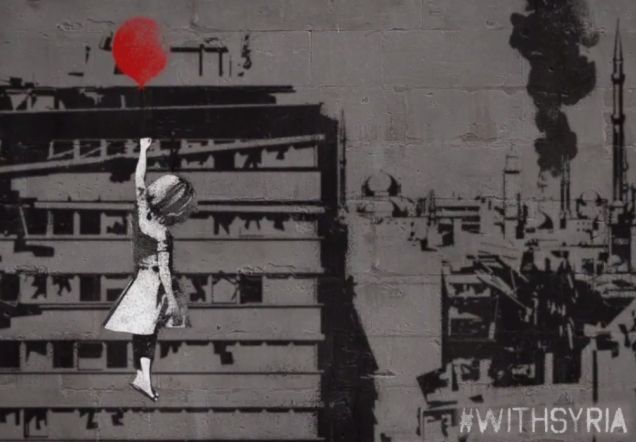
What does security mean to you? That’s the question we’re asking bloggers from different regions of the world in the run-up to our TEDxHagueAcademySalon on Secure Societies.
On the third anniversary of the Syrian conflict, Dima Nicolas describes how everyday life goes on in the world’s most insecure society: living with pain, surviving on hope.
By Dima Nicolas
Image: #WithSyria (YouTube)
“Syria is absolutely the most dangerous country to live in.”
When I hear this as the result of studies, as a person living inside Syria, I am shocked - not because the studies are surprising or untrue, but it is a feeling inside that puts everything you live in front of you and makes you ask yourself: within all those circumstances, how can I still be alive in this country? How many times did death miss me by a hair’s breadth? How many times did a bombshell pass only seconds away? How many times did I escape being arrested or kidnapped or being prevented from entry?
Strangely enough, I feel very lucky. I feel that I belong to a rare section. And these feelings are mixed with a feeling of guilt.
Here in Syria you won’t find a family that haven’t seen their safety crushed in the light of various circumstances, from death and bombing to arrest and kidnappings and high prices. You will find them all feeling unsafe. You will find that whatever you do, you are targeted by one side or another.
Dangerous choices
If you want to revolt for freedom, justice or security, or to work in relief you shouldn’t let your guard down. Only Syrians will really understand the meaning of the expression “clean your mobile and your personal computer”. You could be arrested, and prison wardens have picked up the electronic culture. So the first thing they will ask you about after your arrest will be your Facebook account.
The war has led to dangerous choices. Security adepts will ask you: “Do you want safety or freedom?”
They differentiate between the two things, turning them into warriors on opposite sides, while the two are complementary. Having one of them doesn’t mean excluding the other.
In Syria you can be targeted for your religious background, and sometimes you are forced to hide it to avoid kidnapping. For example, you cannot say “I am Sunni” when you pass a Shia checkpoint, which are widespread in some areas, nor the other way around.
My friend was kidnapped and tortured just because he belonged to the Shia sect. And another one because he was Sunnite. While the citizens came back to their houses in the light of truces and compromises in Damascus and its surroundings. None of the negotiators brought up the dream of the migrants to return to their homes. The dream to return is far away and the migrants have to forget their homes.
“The important thing is that the walls stay... Oh Lord let us return to our home...it is no problem that the house is stolen, the important thing is that it is still there.” The place you feel most secure in is your house. So how is it for the Syrians who were forced to let it go? On the other hand, with great effort you may forget your house, and your memories. But can your mother forget?
No choice but to keep hoping
All parents wake up in the morning asking themselves: will I send my children to school today? Schools have been targeted, students have fallen victim in different regions. Because life goes on, mothers chose to send their children to school, feeling that they are in a luxury position: other mothers don’t have schools in their area to send their children to.
During the war, you will ironically find that sometimes your security is to obtain your daily bread. You can escape from shelling and arrest, you could get used to displacement and you can do nothing but forget the pain. But you are helpless in the face of the rising prices, the lack of job opportunities, the siege of some areas, which makes food virtually non-available. Especially when there are life traders around who sell you a kilo of rice for more than fifty times its real price.
Violation of your security is the arm that the fighting parties in Syria use to go on. And hope is the weapon that the Syrians use to continue their life. So while some find it strange that we study, work and play, that we need to follow sometimes futile events, and while some think that we got used to the war, we find that life goes on and we have no choice but to keep hoping.
Dima Nicolas on Facebook: Resound
What does security mean from the perspective of a young African woman? Read Rosebell Kagumire’s blog in this series on the day-to-day struggle against discrimination.
And Wenjing Fan's blog: What does security mean in China?
